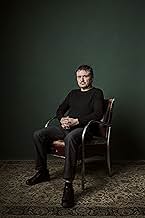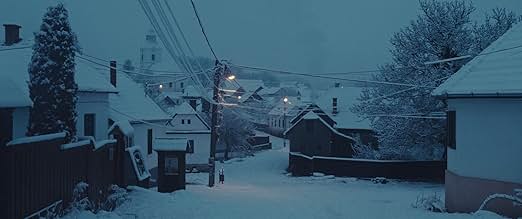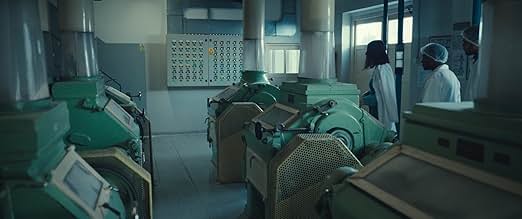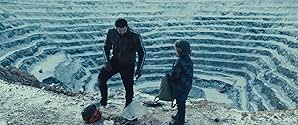IMDb-BEWERTUNG
7,2/10
6306
IHRE BEWERTUNG
Eine Analyse der treibenden Kräfte des menschlichen Verhaltens, wenn wir mit dem Unbekannten konfrontiert werden, der Art und Weise, wie wir den anderen wahrnehmen und wie wir mit einer unge... Alles lesenEine Analyse der treibenden Kräfte des menschlichen Verhaltens, wenn wir mit dem Unbekannten konfrontiert werden, der Art und Weise, wie wir den anderen wahrnehmen und wie wir mit einer ungewissen Zukunft umgehen.Eine Analyse der treibenden Kräfte des menschlichen Verhaltens, wenn wir mit dem Unbekannten konfrontiert werden, der Art und Weise, wie wir den anderen wahrnehmen und wie wir mit einer ungewissen Zukunft umgehen.
- Regie
- Drehbuch
- Hauptbesetzung
- Auszeichnungen
- 7 Gewinne & 18 Nominierungen insgesamt
Endre Rácz
- Tibi
- (as Rácz Endre)
Empfohlene Bewertungen
The director as usual deals with gray areas of morality. No one is all good or bad. All characters - with all their qualities and vices - are simply put, human.
He is able to treat topics such as immigration, racism, east-west, identity politics, etc. Without falling into the trap of being judgmental or prescriptive. No slogans here. All issues depicted naturally through the normal flow of normal people's lives...
The single take in the town hall - which goes on for minutes - must be a milestone in film history! I cannot imagine how many takes he must have had to create this virtually impossible scene. In a single take, so many characters engaging in the liveliest dialogue for minutes...it was breathtaking.
R. M. N. Was 2 hours of a visual and dramatic feast. I cannot wait to see what this great director will produce for us next.
He is able to treat topics such as immigration, racism, east-west, identity politics, etc. Without falling into the trap of being judgmental or prescriptive. No slogans here. All issues depicted naturally through the normal flow of normal people's lives...
The single take in the town hall - which goes on for minutes - must be a milestone in film history! I cannot imagine how many takes he must have had to create this virtually impossible scene. In a single take, so many characters engaging in the liveliest dialogue for minutes...it was breathtaking.
R. M. N. Was 2 hours of a visual and dramatic feast. I cannot wait to see what this great director will produce for us next.
It's been half a decade since Cristian Mungiu's previous film, the excellent Bacalaureat/Graduation, and there's a bit of its thematic DNA in his most recent work. The movie goes beyond that though by exploring a real event which left its mark on Romanian society a few years ago, an event littered with prejudice and xenophobia. R. M. N. Is a bit messy and concludes in an unsatisfying fashion, but rewards the viewer with a layered experience.
From the get-go, there's a coldness to R. M. N. (Romanian abbreviation for Magnetic Resonance Imaging) that you can't shake - it's visual, it's seasonal and it's in the lead character, a monosyllabic bear of a man named Matthias. After an incident occurs while working abroad, he returns home, where more coldness awaits him, as he's met by a distant wife, an emotionally stifled child and a circumspect lover. His home village, set between mountains and forests, stands out by being multiethnic - predominantly Hungarians and Romanians, but also some Germans, like Matthias. The interaction between Mungiu's characters is fascinating to watch, as they transition seamlessly between languages, portraying a well-knit, burgeoning community. It is only after a couple of Sri-Lankan workers arrive to work at the local bakery that the the xenophobe's nest starts stirring.
The movie has a strong build-up, creating a tense atmosphere while setting all its pieces in place. Its characters are faced with more agency than one usual sees, working the underlying beliefs and attitudes onto the screen. And when things turn, they turn quickly and viscously, yet almost unexpectedly - feeding on a sense of unexpressed resentfulness, a feeling primed by our lead's emotional literacy. Similarly to another recent Romanian movie themed around prejudices, Radu Jude's Bad Luck Banging or Loony Porn, R. M. N. Climaxes at a town meeting, where all the paper-thin-arguments you're friendly Facebook neighbour would have shared are laid bare.
To me, this is where the movie wavers. Even as Mungiu tries to maintain a less than judgmental distance from its subjects, there's something so banal and un-cinematic about this kind of stand-off, that it simply cannot carry the burden imposed by the narrative arc. The scene works in spite of this, it works because of the little details and the (un)expected escalation, but it's not a worthy pay-off to what preceded it. And the conclusion that follows it even less so, being close to the absurd in spite of striving for symbolism.
Still, R. M. N. Shouldn't leave you unimpressed. It tackles big themes with passionate interest and concern, which makes up for any shortcomings, thereby proving a worthy addition to Mungiu's impressive catalogue of films.
From the get-go, there's a coldness to R. M. N. (Romanian abbreviation for Magnetic Resonance Imaging) that you can't shake - it's visual, it's seasonal and it's in the lead character, a monosyllabic bear of a man named Matthias. After an incident occurs while working abroad, he returns home, where more coldness awaits him, as he's met by a distant wife, an emotionally stifled child and a circumspect lover. His home village, set between mountains and forests, stands out by being multiethnic - predominantly Hungarians and Romanians, but also some Germans, like Matthias. The interaction between Mungiu's characters is fascinating to watch, as they transition seamlessly between languages, portraying a well-knit, burgeoning community. It is only after a couple of Sri-Lankan workers arrive to work at the local bakery that the the xenophobe's nest starts stirring.
The movie has a strong build-up, creating a tense atmosphere while setting all its pieces in place. Its characters are faced with more agency than one usual sees, working the underlying beliefs and attitudes onto the screen. And when things turn, they turn quickly and viscously, yet almost unexpectedly - feeding on a sense of unexpressed resentfulness, a feeling primed by our lead's emotional literacy. Similarly to another recent Romanian movie themed around prejudices, Radu Jude's Bad Luck Banging or Loony Porn, R. M. N. Climaxes at a town meeting, where all the paper-thin-arguments you're friendly Facebook neighbour would have shared are laid bare.
To me, this is where the movie wavers. Even as Mungiu tries to maintain a less than judgmental distance from its subjects, there's something so banal and un-cinematic about this kind of stand-off, that it simply cannot carry the burden imposed by the narrative arc. The scene works in spite of this, it works because of the little details and the (un)expected escalation, but it's not a worthy pay-off to what preceded it. And the conclusion that follows it even less so, being close to the absurd in spite of striving for symbolism.
Still, R. M. N. Shouldn't leave you unimpressed. It tackles big themes with passionate interest and concern, which makes up for any shortcomings, thereby proving a worthy addition to Mungiu's impressive catalogue of films.
Cristian Mungiu is undoubtedly the best Romanian director working nowadays. He got famous for winning the Palme d'Or in 2007 for his masterpiece "4 Months, 3 Weeks and 2 Days", but hasn't stopped making great films afterwards. "R. M. N." (Magnetic Resonance Imaging in Romanian) is no exception - a gripping social thriller which explores the melting point of socioeconomic forces and simple human emotions.
I had the enorme chance of attending a screening with Cristian Mungiu attending himself. Unlike other directors, he took more than one hour afterwards to discuss the film with the audience, not hesitating to even answer difficult questions in detail. R. M. N. Is a great film, but not an easy one as it's on purpose not filmed how an American film would be filmed (that's what Mungiu said himself) - so I was extremely happy that he explained a lot of the film, it turned out to be one of the most interesting discussions I've ever attended.
Although the film is slow, and at first difficult to access, it's worth sitting through, as Mungiu rewards audiences with an extraordinary showdown in form of a debate in a 17-minute single shot - one of the greatest scenes of the year. The event is based on a a real event of xenophobia and hate which left its mark on Romanian society a few years ago.
The film starts by introducing its protagonist, a monosyllabic man named Matthias who returns home after violently attacking the manager of the German slaughterhouse he works in. Once back in his Romanian village, more conflicts await him, as he's met by a distant wife, an emotionally damaged child and a lover who is quite the opposite of him - she turns out to be the hero of the film, the character we identify ourselves with. When I asked Mungiu why he chose to make an unsympathetic and brutal character as his protagonist, he explained that he didn't want to choose an American approach, that the audience always has to understand, like or identify with the main character. Furthermore, the contrast between the regressive and closed Matthias and the liberal Csilla is meant to portray the inner struggle of every human, the struggle between rational choices and animalistic instincts.
This conflict - inside every human, but equally for the village's inhabitants as well as the two very different lovers - gets serious when the xenophobic event takes place in the village. Without ever accusing an entire group of people, Mungiu shows how every single one is responsible individually and how ideologies clash when communities neglected in the process of globalisation face the antagonistic effects of a market without borders.
Although not a film for the masses, R. M. N. Is once again a very rewarding achievement by the Romanian director, who regularly gives us brilliant insights into an interesting country we watch not enough films from. But as he said himself, has no aspirations to make an English-language film, as long as he still lives in Romania.
I had the enorme chance of attending a screening with Cristian Mungiu attending himself. Unlike other directors, he took more than one hour afterwards to discuss the film with the audience, not hesitating to even answer difficult questions in detail. R. M. N. Is a great film, but not an easy one as it's on purpose not filmed how an American film would be filmed (that's what Mungiu said himself) - so I was extremely happy that he explained a lot of the film, it turned out to be one of the most interesting discussions I've ever attended.
Although the film is slow, and at first difficult to access, it's worth sitting through, as Mungiu rewards audiences with an extraordinary showdown in form of a debate in a 17-minute single shot - one of the greatest scenes of the year. The event is based on a a real event of xenophobia and hate which left its mark on Romanian society a few years ago.
The film starts by introducing its protagonist, a monosyllabic man named Matthias who returns home after violently attacking the manager of the German slaughterhouse he works in. Once back in his Romanian village, more conflicts await him, as he's met by a distant wife, an emotionally damaged child and a lover who is quite the opposite of him - she turns out to be the hero of the film, the character we identify ourselves with. When I asked Mungiu why he chose to make an unsympathetic and brutal character as his protagonist, he explained that he didn't want to choose an American approach, that the audience always has to understand, like or identify with the main character. Furthermore, the contrast between the regressive and closed Matthias and the liberal Csilla is meant to portray the inner struggle of every human, the struggle between rational choices and animalistic instincts.
This conflict - inside every human, but equally for the village's inhabitants as well as the two very different lovers - gets serious when the xenophobic event takes place in the village. Without ever accusing an entire group of people, Mungiu shows how every single one is responsible individually and how ideologies clash when communities neglected in the process of globalisation face the antagonistic effects of a market without borders.
Although not a film for the masses, R. M. N. Is once again a very rewarding achievement by the Romanian director, who regularly gives us brilliant insights into an interesting country we watch not enough films from. But as he said himself, has no aspirations to make an English-language film, as long as he still lives in Romania.
This is not a film for those of us who watch movies casually. If you pay close attention to the gloriously intricate details of this film, the ending will leave you speechless and full of ruminations for days (maybe even weeks) to come.
The characters in this film are not cartoonish one-note ideas -- they're complex full human beings. We have a brilliant anti-hero as our lead, a morally-confused "working woman" type as our second lead, and a village whole as our third lead. Think this sounds boring? Give the film a chance and let it seep in. It's firing on all cylinders - beautiful, moody, dark, socially-relevant without being preachy or preening.
Mungiu is a master and has yet to make a bad movie.
The characters in this film are not cartoonish one-note ideas -- they're complex full human beings. We have a brilliant anti-hero as our lead, a morally-confused "working woman" type as our second lead, and a village whole as our third lead. Think this sounds boring? Give the film a chance and let it seep in. It's firing on all cylinders - beautiful, moody, dark, socially-relevant without being preachy or preening.
Mungiu is a master and has yet to make a bad movie.
I don't know this director from Roumania, some kind of a Roumanian Ken Loach, but I guess he is one of the best on the market. I will try to check what he did besides this one. It is not a light hearted story, it speaks of something very serious, dark, realistic, gritty. A tale about racism, intolerance, human behaviour, towards strangers, especially if they are foreigners come to work. I am sure it is like this in many countries, many places. This is not an easy topic to speak about. It is very well told, shown. It may be disturbing because too close to reality, to actual events and tragedies which we don't necessarily hear of.
Wusstest du schon
- WissenswertesMungiu named the film after a Romanian acronym for -nuclear magnetic resonance-, as the film is "an investigation of the brain, a brain scan trying to detect things below the surface".
- SoundtracksYumenji's Theme
Composed by Shigeru Umebayashi for Der Klang der Liebe (2000)
Top-Auswahl
Melde dich zum Bewerten an und greife auf die Watchlist für personalisierte Empfehlungen zu.
- How long is R.M.N.?Powered by Alexa
Details
- Erscheinungsdatum
- Herkunftsländer
- Sprachen
- Auch bekannt als
- R.M.N.
- Drehorte
- Panemar - Râtu Mare FN, Jucu, Cluj County, Rumänien(baking factory)
- Produktionsfirmen
- Weitere beteiligte Unternehmen bei IMDbPro anzeigen
Box Office
- Bruttoertrag in den USA und Kanada
- 46.360 $
- Eröffnungswochenende in den USA und in Kanada
- 6.121 $
- 30. Apr. 2023
- Weltweiter Bruttoertrag
- 738.520 $
- Laufzeit
- 2 Std. 5 Min.(125 min)
- Farbe
- Seitenverhältnis
- 2.39 : 1
Zu dieser Seite beitragen
Bearbeitung vorschlagen oder fehlenden Inhalt hinzufügen























